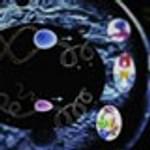The Oxford Martin Programme on
Nanotechnology

The Oxford Martin Programme on Nanotechnology was established at the Oxford Martin School in 2008, evolving from a project on nanoscience for medicine. The grant from the School ended in 2013 and the following page is an archived resource.

the project
We are working at the interface of biology, physics, chemistry and engineering to create the tools to facilitate novel strategies for new treatments using nanostructures that target disease and promote healing.
Nanotechnology has the potential to revolutionise the way we detect and treat trauma and disease. However, much work is needed to establish fundamental design principles and understand potential nano-toxicological effects before effective treatments can be developed.
We provide a catalysing network of expertise for Oxford University researchers who are working to understand the nanoscale effects of biomolecular interactions. We take both experimental and computational approaches in measuring and modelling these interactions to better develop new drug delivery techniques.
Projects
Nano-antibiotics: Antimicrobial resistance is common. It has developed against every class of antimicrobial drug and appears to be spreading into new clinical niches. We are designing new nanoparticle-based approaches to developing antibiotics. These new methods are expected to overcome the capacity of bacteria to acquire antibiotic resistance.
We are developing new imaging methods based on atomic force microscopy (AFM) for high resolution imaging of bacterial cells, DNA and DNA-molecular motors to study the effect of antibiotic drugs at the single molecule level.
Nano-Bio Materials: Biomaterials and medical devices constitute a $100 billion industry that improves the quality of life for millions of people. Nanotechnology has the potential to transform biomaterials by tuning their properties at the nanoscale to unlock the body's innate powers of organisation and self-repair, harnessing the regenerative capacity of tissues. We aim to understand the basic science of "biocompatibility" and use it to design novel materials tailored for their specific function. We are creating nanostructure-based nano-composites with biopolymers where we control the mechanical properties and the interface with biomolecules and biological fluids. These new surfaces and materials are studied in contact with proteins, DNA, living cells and in vitro tissue cultures.
Drug Delivery Systems: Surgery, chemotherapy and radiation are the chief methods for cancer treatments but are highly invasive, damage healthy tissue and induce severe side-effects. The aim of this project is to develop a new multimodal cell-specific drug delivery system that selectively targets cancer cells, improves drug stabilization and avoids damage of healthy tissues.
videos
"Nanotechnology: the big picture" with Dr Eric Drexler and Dr Sonia Trigueros
"Nanotechnology for energy: an entrepreneurial perspective" with Prof Javier Garcia Martinez
"Nanotube-packed pills could target cancer directly" with Dr Sonia Trigueros
"Is a vaccine for cancer possible?" with Dr Sonia Trigueros
Next big thing: Nanotechnology - Q & A
Next big thing: Nanotechnology - Dr Sonia Contera
Next big thing : Nanotechnology - Professor Richard Jones
Next big thing: Nanotechnology - John Knowles
Next big thing: Nanotechnology - Dr Eric Drexler
"Nanomedicine – time to bridge the gap from experimental science to product regulation" with Dr Sonia Trigueros
Can nanotechnology help cure cancer?
"Emerging healthcare technologies" - Panel Discussion
How physicists are moving into biology
Breakthroughs in Nanomedicine
Nanomedicine: Challenges and opportunities
What can nanotechnology do for medicine?
The Future of Medicine
Nanoscience and new technologies for medicine
publications

Mapping nanomechanical properties of live cells

Lipidbook

Studies on viral fusion peptides: the distribution of lipophilic and electrostatic potential over the peptide determines the angle of insertion into a membrane

The interaction of C60 and its derivatives with a lipid bilayer via molecular dynamics simulations

Carbon nanotube self-assembly with lipids and detergent: a molecular dynamics study

Doping of carbon nanotubes with nitrogen improves protein coverage whilst retaining correct conformation

Blocking of Carbon Nanotube Based Nanoinjectors by Lipids: a Simulation Study
Keep in touch
If you found this page useful, sign up to our monthly digest of the latest news and events
Subscribe